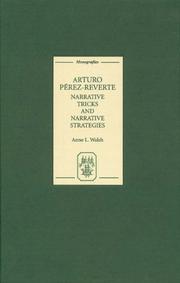| Listing 1 - 7 of 7 |
Sort by
|

ISBN: 9781855661509 9781846155178 Year: 2007 Publisher: Woodbridge Tamesis
Abstract | Keywords | Export | Availability | Bookmark
 Loading...
Loading...Choose an application
- Reference Manager
- EndNote
- RefWorks (Direct export to RefWorks)
Fiction --- 860 "19" PÉREZ-REVERTE, ARTURO --- Fiction writing --- Metafiction --- Writing, Fiction --- Authorship --- Technique --- Spaanse literatuur--20e eeuw. Periode 1900-1999--PÉREZ-REVERTE, ARTURO --- Pérez-Reverte, Arturo --- Reverte, Arturo Pérez --- -Перес-Реверте, Артуро --- פרז רוורטה, ארתורו --- Criticism and interpretation. --- Technique.
Book
ISBN: 1282185152 9786612185151 1846155177 Year: 2007 Publisher: Woodbridge : Tamesis,
Abstract | Keywords | Export | Availability | Bookmark
 Loading...
Loading...Choose an application
- Reference Manager
- EndNote
- RefWorks (Direct export to RefWorks)
The complex narrative technique of one of Spain's most renowned contemporary authors. The writings of Arturo P©♭rez-Reverte, one of Spain's most renowned contemporary authors, have been described as a minefield. This monograph examines the complexities behind the narrative technique employed in creating such a minefield, including an analysis of the role played by both male and female characters, the relevance of the past as a motif, and aspects of the role of storytelling in creating mystery where none should exist. Both Revertian novelsand journalistic writing are seen to be part of an over-all game which is played between their author and his readers. Film, too, forms part of the material reviewed as, though P©♭rez-Reverte is not a script writer, many films have been based on his novels. The text-centred analysis concludes that the themes of interest in all Revertian output revolve around two main areas: the significance of the past, whether historical, cultural, or literary, andthe role of the written word in communicating, in rescuing and in challenging versions of that past in order to combat what P©♭rez-Reverte terms 'dismemory'. ANNE L. WALSH lectures in Hispanic Studies at University College, Cork.
Fiction --- Technique. --- Pérez-Reverte, Arturo --- Criticism and interpretation. --- Fiction writing --- Metafiction --- Writing, Fiction --- Authorship --- Reverte, Arturo Pérez --- -Перес-Реверте, Артуро --- פרז רוורטה, ארתורו --- Perez-Reverte, Arturo
Book
ISBN: 1443895741 1527500454 Year: 2017 Publisher: Cambridge Scholars Publishing
Abstract | Keywords | Export | Availability | Bookmark
 Loading...
Loading...Choose an application
- Reference Manager
- EndNote
- RefWorks (Direct export to RefWorks)
Book
Year: 2015 Publisher: Newcastle upon Tyne, United Kingdom : Cambridge Scholars Publishing,
Abstract | Keywords | Export | Availability | Bookmark
 Loading...
Loading...Choose an application
- Reference Manager
- EndNote
- RefWorks (Direct export to RefWorks)
This volume delves deeply into the role played by stories and storytelling in shaping, controlling and mapping present-day Spain, and examines fiction in various manifestations and genres, especially written and filmic. It contrasts such stories and their context with the past, investigating the differences and similarities between spatially and geographically varying narrations in order to tease out the link between the time of telling and the act of living. Throughout the book, scholars look separately at this phenomenon, and their findings reveal a close bond between events occurring in the real world and the relating of fictional stories. Particularly in Spain, the geographic space of interest here, storytelling is used both as catharsis and didactically. Authors and filmmakers find inspiration in everyday occurrences, and, while there is nothing unusual in that, the interest here lies in the consequent transformation of these occurrences into fascinating stories that attempt to make sense of chaotic events, connect those events temporally, and explore the meaning of the consequent coherence. Stories are at the very essence of humanity, be they fictional or based on everyday reality. This collection focuses specifically on Spain where easily identifiable features of history (such as the Spanish Civil War, the Franco Dictatorship, transition, democracy, and the global economic crisis) have had a major impact on everyday life. The narratives emerging show clear evidence of that impact, with an emphasis on such themes as the significance of memory, the impossibility and instability of such memory, the chaotic nature of life, and the place of the nation/state in the psyche of the individual, with emerging themes investigating the role of solidarity and empathy in the empowerment of the individual. This volume is informed by the shift that occurred in the twentieth century towards a world of unstable parameters, whereby whatever knowledge that is received must be questioned as to the extent of its authenticity since that knowledge is always affected by memory, experience, and time, all subjective phenomena in themselves.

ISBN: 9781846155178 9781855661509 Year: 2007 Publisher: Woodbridge Tamesis
Abstract | Keywords | Export | Availability | Bookmark
 Loading...
Loading...Choose an application
- Reference Manager
- EndNote
- RefWorks (Direct export to RefWorks)
Book
ISBN: 9788479624637 Year: 2009 Publisher: Madrid : Editorial Verbum,
Abstract | Keywords | Export | Availability | Bookmark
 Loading...
Loading...Choose an application
- Reference Manager
- EndNote
- RefWorks (Direct export to RefWorks)
España --- España --- Literatura española --- Spanish literature --- War in literature. --- Historia --- En la literatura --- Historia --- En la literatura --- Historia y crítica. --- History and criticism
Book

ISBN: 1611485312 9781611485318 9781611485301 1611485304 9781611485301 Year: 2014 Publisher: Lanham Bucknell University Press
Abstract | Keywords | Export | Availability | Bookmark
 Loading...
Loading...Choose an application
- Reference Manager
- EndNote
- RefWorks (Direct export to RefWorks)
This book proposes a new direction for the study of Spanish literature of the 1940s, 1950s and early 1960s, arguing that novels of this period merit a fresh critical approach that enriches existing perspectives on the Spanish novel during the first two decades of the Franco dictatorship. Essays take an interdisciplinary approach to reveal how contemporary cultural theory relating to memory and trauma can enhance our understanding of the postwar Spanish novel.
| Listing 1 - 7 of 7 |
Sort by
|

 Search
Search Feedback
Feedback About UniCat
About UniCat  Help
Help News
News